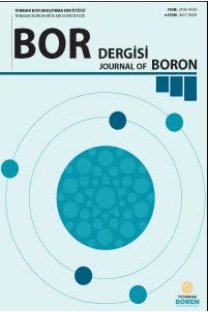Mikrodalga enerjisinin kolemanit cevherinin ufalanmasına ve flotasyonuna etkisi
Mikrodalga, ufalama, flotasyon, kolemanit, bor mineralleri
Effect of microwave energy on the comminution and flotation of colemanite ore
Microwave, comminution, flotation, colemanite, boron minerals,
___
- [1] Vorster W., The effect of microwawe radiation on mineral proceessing, Doktora Tezi, The University of Birmingham Birmingham, 2001.
- [2] Al-Harahsheh M., Kingman, S. W., Microwave-assisted leaching—a review, Hydrometallurgy, 73 (3-4), 189-203, 2004.
- [3] Marland S., Han B., Merchant A., Rowson N., The effect of microwave radiation on coal grindability, Fuel, 79, 1283-1288, 2000.
- [4] Uslu T., Atalay Ü., Arol A. İ., Effect of microwave heating on magnetic separation of pyrite, Colloids Surf. A, 225 (1-3), 161-167, 2003.
- [5] Eskibalcı M. F., Cevher hazırlama ve zenginleştirmede mikrodalga enerjisinin kullanılabilirliğinin araştırılması, Doktora Tezi, İstanbul Üniversitesi, Maden Mühendisliği Bölümü, İstanbul, 2007.
- [6] Özbayoğlu G., Depci T., Ataman N., Effect of microwaver radiation on coal flotation, Energy Source Part A, 31 (6) 492-499, 2009.
- [7] Sayın Z. E., Altın konsantresinden doğrudan liç eldesi, Doktora Tezi, Dokuz Eylül Üniversitesi Maden Mühendisliği, İzmir, 2010.
- [8] Tosun Y. İ., Microwave activated crushing and grinding of turkish coals and shale for cleaning and desulfurization, XVI Balkan Mineral Processing Congress, Belgrad, 2015.
- [9] Güngören C., Ultrasonik ve mikrodalga enerjilerinin kolemanit flotasyonunda ön işlem olarak kullanılma olanaklarının araştırılması, Yüksek Lisans Tezi, İstanbul Üniversitesi, Maden Mühendisliği, 2009.
- [10] Güngören C., Özkan Ş. G., Hacıfazlıoğlu H., Mikrodalga kurutmanın linyit kömürünün öğütülebilirliğine etkisi, Bilimsel Madencilik Dergisi, 55 (4) 15-22, 2016.
- [11] Özkan Ş. G., Eskibalcı M. F., Güngören C., Mikrodalga enerjisinin kolemanit ve uleksitin sudaki çözünürlüğüne etkisinin araştırılması, İstanbul Yerbilimleri Dergisi, 22 (1) 85-93, 2009.
- [12] Chattopadhyay A. K., Gaona T., Bosley B., Microwave-assisted direct synthesis of boronated alkanolamine succinic anhydride esters as potential surfactants for various application, BORON 1 (1), 28 - 32, 2016.
- [13] Buttress A. J., Katrib J., Jones D. A., Batchelor A. R., Craig D. A., Royal T. A., Dodds, C., et al., Minerals Engineering 109,169–183, 2017.
- [14] Jiang T., Zhang Q., Liu Y., Xue X., Duan P., Influence of microwave irradiation on boron concentrate activationwith an emphasis on surface properties, Appl. Surf. Sci., 385, 88–98, 2016.
- [15] Rattanadecho P., Makul N, Microwave-assisted drying: A review of the state-of-the-art, Dryıng Technol., 34 (1), 1–38, 2016.
- [16] Eskibalcı M. F., Konvansiyonel ve mikrodalga ısıtma işleminin kuvarsitin öğütülebilirliğine etkisinin incelenmesi, EÜFEB Fen Bilimleri Enstitüsü Dergisi, 7 (2) 169-190, 2014.
- [17] Delibalta M. S., Toraman O. Y., The effect of microwave energy on grindability of a turkish high-ash coal, Energy Sci. and Technol., 3 (2) 46-49, 2012. [18] Toraman O. Y., The effect of high power microwave energy on the grindability of turkish cayirhan lignite, Energy Source Part A, 32 (19) 1794-1800, 2010.
- [19] Toraman Ö. Y., Depçi T., Kömürde mikrodalga ile önişlem uygulamaları, Madencilik, 46 (3) 43-53, 2007.
- [20] Samanlı S., Öney Ö., Geveze K., Mikrodalga kurutmanın kaolen numunesinin bilyalı değirmendeki özgül kırılma hızını artırıcı etkisi, Dokuz Eylül Üniversitesi-Mühendislik Fakültesi Fen ve Mühendislik Dergisi, 19 (55) 267-278, 2017. [21] İpek H., Şahan H., Effect of heat treatment on breakage rate function of ulexite, Physicochem. Probl. Miner. Process. 49(2) 651−658, 2013.
- [22] Can N. M., Bayraktar I., Effect of microwave treatment on the flotation and magnetic separation properties of pyrite, chalcopyrite, galena and sphalerite, Miner. and Metall. Process., 23 (3) 185-192, 2007.
- [23] Batchelor A. R., Buttress A. J., Jones D. A., Katrib J., Way D., Chenje, T., Stoll, D., et al., Towards large scale microwave treatment of ores: Part 2 – Metallurgical testing, Miner., Eng., 111, 5–24, 2017.
- [24] Kingman S. W., Vorster W., Rowson N. A., The influence of mineralogy on microwave assited grinding, Miner. Eng.,13 (3), 313-327, 2000.
- [25] Guo S.., Chen G., Peng J., Chen J., Li D., Liu L., Microwave assisted grinding of ilmenite ore, Transactions of Nonferrous Metals Society of China, 21 (9), 2122-2126, 2011.
- [26] Zhu X., Tao Y., Sun Q., Effects of microwave pretreatment on the grinding characteristic of coal, Energ Source Part A, 38 (18), 2741-2748, 2016. [27] Xia W., Yang J., Liang C., Effect of microwave pretreatment on oxidized coal flotation, Powder Technol., 233, 186-189, 2013.
- [28] Can M. F., Helvaci A., Yazıcı Z. O., Akpınar S., Özdemir Y., Microwave assisted calcination of colemanite powders, International Journal of Metallurgical & Materials Engineering, 2 (2) 2016.
- [29] Kocakuşak S., Köroğlu J. H., Ekinci E., Tolun R., Production of anhydrous borax using microwave heating, Ind. Eng. Chem. Res., 34, 881-885,1995.
- [30] Tombal T.D., Özkan Ş. G., Kurşun Ünver İ., Osmanlıoğlu A. E., Bor bileşiklerinin özellikleri, üretimi, kullanımı ve nükleer reaktör teknolojisinde önemi, BORON, 1 (2), 86 - 95, 2016.
- ISSN: 2149-9020
- Yayın Aralığı: 4
- Başlangıç: 2016
- Yayıncı: TENMAK Bor Araştırma Enstitüsü
Borojipsin diamonyum hidrojen fosfat çözeltilerinde çözünürlüğünün incelenmesi
Havva Mumcu Şimşek, Rövşen Guliyev, Ayşe Vildan Beşe, Hacer İçen
Gülşah ÇELİK GÜL, Figen KURTULUŞ, Halil GÜLER
Alternating current electrophoretic deposition of HA and hBN nanoparticles on Ti substrate
Nuran AY, Yapıncak GÖNCÜ, Merve GEÇGİN
Mikrodalga enerjisinin kolemanit cevherinin ufalanmasına ve flotasyonuna etkisi
İsmail DEMİR, Can GÜNGÖREN, Şafak Gökhan ÖZKAN
Borate deposits: An overview and future forecast with regard to mineral deposits
Synthesis and characterization of multi-functional material MoBP3 O12
Halil GÜLER, Figen KURTULUŞ, Gülşah Çelik GÜL
Merve GEÇGİN, Yapıncak GÖNCÜ, Nuran AY
Mehran RAFİEAZAD, Özge BALCI, Selçuk ACAR, Mehmet SOMER
In-situ formation of borides and enhancement of powder metallurgy properties
Tuncay ŞİMŞEK, Mustafa BARIŞ, Arun K. CHATTOPADHYAY, Murat BİLEN
